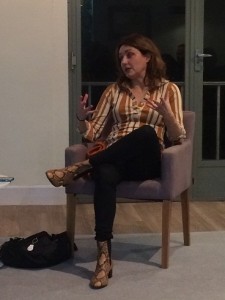 On Wednesday evening Viv Albertine performed what is now becoming a more usual kind of gig for her to a packed room. She was reading from and discussing her memoir Clothes, Clothes, Clothes. Music, Music, Music. Boys, Boys, Boys (Faber and Faber).
On Wednesday evening Viv Albertine performed what is now becoming a more usual kind of gig for her to a packed room. She was reading from and discussing her memoir Clothes, Clothes, Clothes. Music, Music, Music. Boys, Boys, Boys (Faber and Faber).
The title, apparently, used to come from her mother’s favourite nag – that she wads only interested in’ Clothes, clothes, clothes. Music, music, music. Boys, boys, boys’. ‘Which goes to show’, said Albertine, ‘that no matter how superficial your interests, if you try hard enough you can really turn them into something.’
Perhaps not quite what her mother had in mind, but it is, of course, this mixture of subversiveness, humour and readiness to make herself the butt of the joke that is, and has always been, Albertine’s great appeal. Both in her extracts from the book and in person, Albertine was sharp, engaging, confident in revealing her quirks, mistakes and lacks of confidence, and incredibly likeable.
Most famously the guitarist of The Slits, Albertine’s book, as she pointed out, is not purely, or even predominantly, a factual autobiography of her time in one of the punk movement’s most famous bands, but, as a personal memoir, a book that spans much wider period of time. And, as she pointed out, being in the band, though it may be the most important thing about her to others, is not necessarily the most important experience of her life. Nonetheless, there is not only a lot of material from this time, but in many ways the ethos of the band – uncompromising, problematically feminist, messy, defiant – is also the ethos of the book, which deals such post-punk material as cancer, IVF, divorce, Audis and middle-age with as much visceral frankness and humour as her stories of trying to give Jonny Rotten a blow job, or having Johnny Thunders persuade her to take heroin.
On which note, we did get a tour of the book’s sex scenes – whilst Albertine assured us there was ‘other stuff in there’, she couldn’t resist the urge to give us what she clearly considers the most entertaining sections of the book – which are ribald but deftly written scenes of embarrassing sexual encounter – which Albertine seemed to take some delight in retelling. One had the sense that perhaps she deliberately makes herself take on more humiliation than the situation demands – but it was clear that she viewed encountering the ways in which she experienced her sexuality, and expressions of it, as humiliating, as an important feminist project – an attempt at honestly analyzing how the pressures put upon women to express their sexuality – both in the seventies and nowadays – manifested themselves in her own experience. She was also insistent on seeing her whole career through the lens of feminism – pointing out that punk’s refusal to assimilate to the expectations of larger culture was, for The Slits and other female punks, an explicitly feminist project – even being in a band was a refusal of the expectations of the limited life that women at the time, from childhood, were trained to expect and desire.
Albertine was also incredibly thoughtful and eloquent about craft – proving repeatedly that even a memoir which may seem very warts-and-all is actually the product of a huge amount of structuring and editing. Talking about her initial ideas of structure – that each chapter would, stemming from the title, be structured by a ‘boy’, this scheme, she says, fell away a year into the three year writing project – but was fundamental in getting the memoir started. Albertine revealed that she kept a note over her workspace saying ‘The Book is Boss’ – subordinating any personal discomfort for the sake of a better book – but also editing out many scenes and events from the first to second draft in order to make the book’s structure work. Part way through, she said, she realized that she was writing a story about a woman who had struggled against expectations to make music, retreated to middle-class, married life and then had to struggle against the expectations and conventions of this new found life in order to, yet again, make music. This structure of life and book discovered, scenes which detracted from this narrative, or weren’t deemed interesting enough for the reader, were discarded, while pieces that she had written for herself, only as a joke or to get her started writing first thing in the day, ended up having to stay – including a piece about her labia that many critics have picked on as one of the braver pieces of the memoir. It seemed that, although Albertine may often be the butt of her own joke in the book, the process of writing it had enabled a form of self confidence and allowed her to find, not only structure in her life, but understanding of the events of it – it was only when writing the book, she said, that she realized that Johnny Thunders had manipulated the situation leasing up to her taking heroin in order to make her vulnerable, rather than acting kindly by pre-warning her that she was about to be kicked out of The Flowers of Romance. Both the life she told, and her insights into what enabled her to tell this life as well as she has done, were fascinating.
